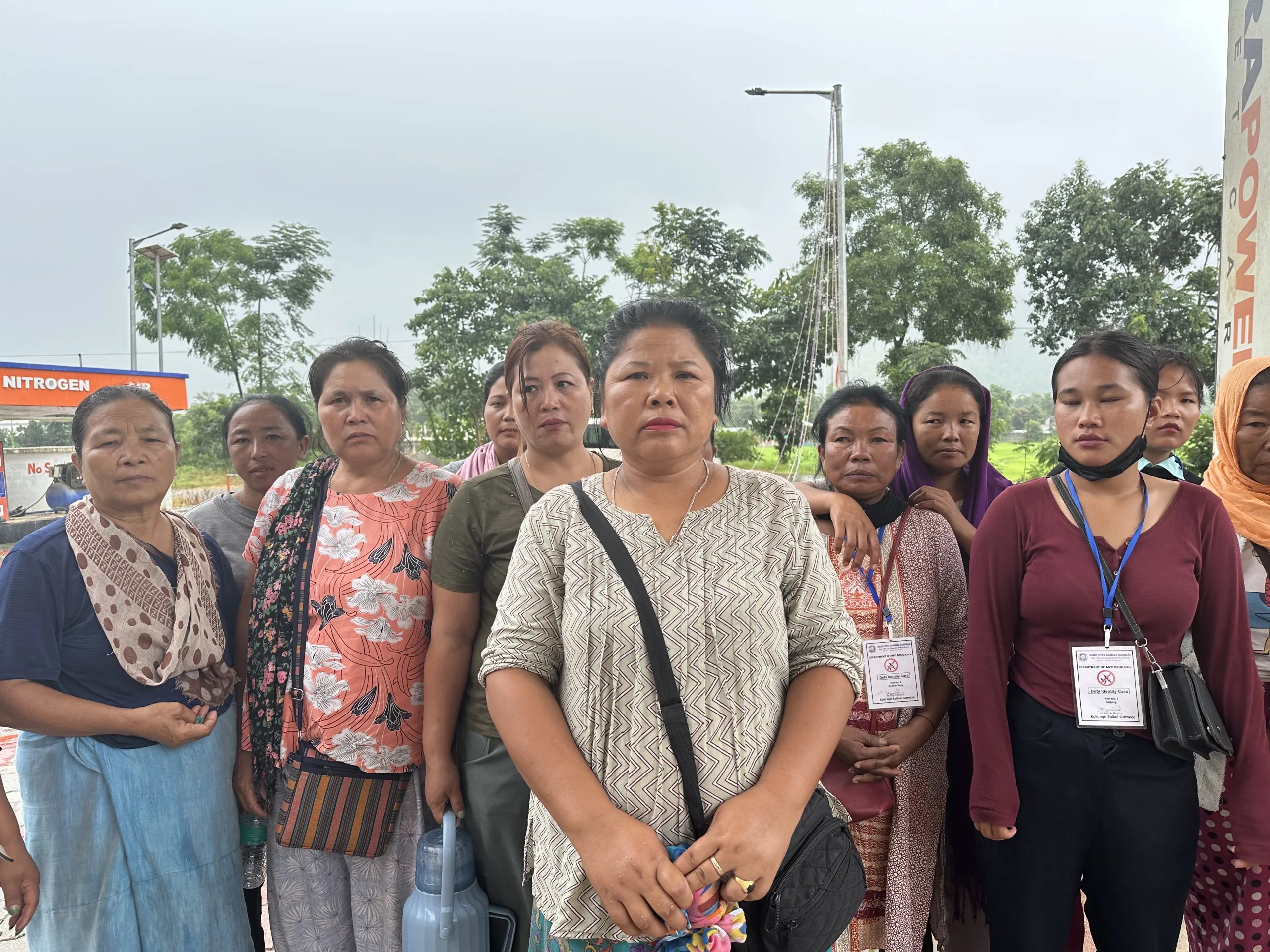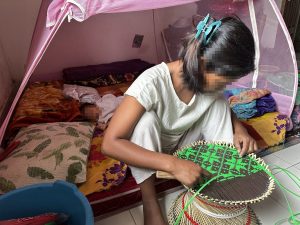When Women Became The Main Spectacle In Manipur’s Civil Conflict

Sangi Duhlian is constantly browsing her phone for updates on the Gaza war on social media. She is anxious and triggered by the war in the Middle East, especially as she had witnessed one in her home state of Manipur since May. The conflict between the ethnic majority Meitei and the minority Kuki-Zo tribes that broke out in the state in May and continues has now claimed 175 lives according to the official estimates, injured thousands and left over 70,000 people displaced internally both within the state and elsewhere in India. When Israel began its military operation in the occupied territory of Gaza in October, Duhlian was conducting relief operations in her hometown Lamka, in Churachandpur tribal hill district.
“When I see what’s happening to the people in Gaza, I’m reminded of our own situation,” says Duhlian, a feminist researcher with Women in Governance (a national network of women activists working in conflict zones) who now lives in Mizoram where she is doing her PhD. “We are like the Palestinians”
Many activists we spoke to from the Kuki Zo community see a similarity in the military operations in Gaza and the ones conducted in the tribal hill pockets of Manipur since May. On October 31, almost 2000 women and children fled their villages after state commandos and defence forces personnel began combing through the villages in Tengnoupal hill district looking for militants. A day earlier, a Manipur police official from the Meitei community stationed in the district bordering Myanmar was killed by a sniper rifle fired allegedly by militants belonging to the Kuki-Zo tribes. Following this, tribal communities who had been demanding the complete removal of Meitei personnel from the hills have alleged mass looting and harassment by ‘Meitei’ police commandos, driving them to hide out in the forests.
Nengboi Hoizaning Kipgen, the wife of the Chief of Govajang, a village in Tengnoupal district where the combing operation took place, said that residents allege that police commandos had ransacked their homes, stealing their money and destroying their food grains. She and two other women, including a 15 year old, allege they were also manhandled and molested by those they believe to be extremist elements masquerading as police commandos. “They called us prostitutes, saying they can do whatever they want,” said Kipgen. “They said that this was all Meitei land.”
The district police chief denied molestation allegations to the media. Sources in the central security forces, which remains the most neutral force on the ground considering that the state police is divided along ethnic lines, confirmed “some incidents” occurred but couldn’t comment on the perpetrators.
As the conflict in Manipur – a state that shares a 398 kilometre border with Myanmar – enters the eighth month since violence broke out after a protest opposing special benefits to the Meiti community in May, the war is nowhere near an end or even de-escalation.
While the Kuki-Zo tribes suffered in greater numbers in the initial phase of the conflict, mostly in the valley where the Meitei communities dominate, many have enlisted to fight the valley based insurgent groups and Meitei extremist groups, such as Arambai Tenggol and Meitei Leepun. With government created buffer zones dividing the hills and the valley, the state is completely divided along ethnic lines now like never before, where inter district boundaries have become international borders. The BJP led central government has remained silent on the ongoing violence in Manipur, while condemning international “interference”.
Tingneihchong Gangte, President of the local chapter of Kuki Organization for Human Rights, told Behanbox that the women and children fled to six locations, including army camps since they no longer felt safe in their homes. Footage of several women and children sleeping out in the cold snuggled under Burmese blankets on mattresses outside an army camp had gone viral by November 2. “The men couldn’t stay in the villages or come outside of the forest fearing they may be arrested or tortured if they are taken to jail,” she said.
Such instances of men fleeing their villages during combing operations by security forces in tribal villages is a familiar pattern in conflict zones in India, whether in the Northeast or the mining rich belts in Central India. However, unlike previous instances, the perpetrators of sexual violence in Manipur are men from the dominant ethnic community.
Unfolding Sexual Violence
In mid July, a disturbing video footage of two women being paraded naked through the fields after the looting and massacre in a tribal village went viral. The video, at once, brought to national attention, the reality of brutal sexual violence amidst the conflict. Until then,instances of rape and sexual violence on tribal women were largely unreported and lost in the din of one community’s narrative over the other. The video prompted Prime Minister Narendra Modi, who is yet to speak on the conflict or visit the state, to come out and condemn the incident as “an insult to society”.
Duhlian said that the video helped verify the sexual assault allegations. “With so much fake news and everything becoming our word against theirs, the video was the ultimate proof,” she said.
However, it was also deeply traumatising for the Kuki Zo women in the state, said Duhlian, who belongs to the same Vaiphei tribe as the women in the viral video. “I remember not being able to sleep fearing benign watched. I felt uneasy to even undress myself in the bathroom,” she told Behanbox. The naked parade, said Duhlian, showed the way they (Meitei majority) look down at tribal women.
Then in September, photos of a missing teenage couple from the Meitei community went viral just as the ban on mobile internet services was lifted temporarily for a day. In one of the photos, the teens have their hands tied behind their backs with armed militants standing guard at a distance, while another showed their lifeless bodies. Leaders from the Meitei community speculated that ‘the girl held captive for four days, raped and murdered’. The Manipur state government confirmed their deaths in July even though their bodies were yet to be recovered and offered no details of the circumstances.
Within 48 hours of the internet ban being lifted, the teenage girl’s photo went viral as a Display Photo on several social media profiles,with many social media accounts speculating that she was raped, though no evidence has emerged to date. What also followed was the arrest of some of the accused from the Kuki-Zo community, including women and children.
Bangalore based journalist Romal Laisram, who belongs to the Meitei community, said that rape has emerged as a tool for revenge. “People are able to make peace with themselves and the ‘fact’ that these acts of violence and aggression were committed during a ‘war’ and are, therefore, ‘understandable’,” he told Behanbox.
“The teenager’s death,” said Laisram, “was something considered more grievous to a community desensitised to rape.”
Role of Meira Paibis
Several accounts by tribal women who were sexually assaulted have alleged the role of Meira Paibis in perpetuating violence against women by handing them over to mobs that assaulted and/or raped them.
Nancy Chingthianniang, a 29-year-old year old woman, told Behanbox that she lost her husband and mother- in- law to the mob of Meitei men and women who lynched them to death. “They (Meira Paibis) were telling the mob to rape me but they didn’t do it. Instead they beat me up so badly that I passed out after someone hit me on the head,” she said.
Meira Paibis, or the women torchbearers, have an iconic place in Manipur’s history. They led the Nupi Lan, India’s first women led agitation in 1904 against the unfair taxation system imposed by the British on the locals during a severe food crisis. The movement went on to define social movements in the country.
In 2004, they took on the Indian Army in Imphal at the Kangla Fort by stripping naked in front of the sentry men to protest the extrajudicial encounter of Manorama Devi, whose body was found riddled with bullets and signs of sexual assault. Against their naked bodies draped with banners saying “Indian Army Rape Us”, they compelled the army to move their post from Kangla Fort, even though the accused were never brought to justice.
Lourembam Nganbi, a Meira Paibi leader and president of the AMKIL (United Mothers to Protect Manipur) who had once participated in the naked protest, told The Wire in an interview that Meitei women had been raped, an allegation that mostly turned out to be an online rumour spread since the day that violence broke out, triggering some of the sexual assault attacks on Kuki-Zo women. Although only one Meitei complainant came forward with rape charges in August, Meira Paibis continue to further the claim that Kuki Zo women were raped in response to sexual violence against women from their community, mainly as they are booked as accomplices in cases registered with the police.
Laisram, who grew up idolising the Meira Paibis, is shocked to hear about their role in the violence in the state and especially against women. “I remember my father taking me to the Nupi Lan memorial,beaming with pride that women in the valley had led a movement against the British,” he said. “They’ve always been people who upheld social justice and fought for minorities and the voiceless. So you grow up believing that even if the government or the men fail, the women will uphold the torch”
But over time, said Laisram, there is a visible shift in their movement. From opposing state repression and especially the Armed Forces Special Powers Act ( AFSPA, an act which gives unbridled powers to the security forces to shoot, arrest and kill a person), it has assumed a vigilante nature with acts like storming a party where women were drinking alcohol. Months before the violence began, the AFSPA had been lifted from the entire Meitei occupied valley leaving it in effect only in the hill districts of Manipur. The law is reviewed every six months by the Central government based on the recommendations of the state government. Several videos and news reports have shown imas ( ‘mothers’ in Meitei Lon as they are commonly referred to and revered as) standing guard at the buffer zones, checking vehicles for possession of illicit drugs, alcohol or Kuki-Zo people.
Laisram explained that an overpowering sense of Meitei victimisation that has defined the problems in the valley, like cruch over natural resources like water and pollution of rivers that is being blamed on poppy cultivation in the hills, has also seeped into the Meira Paibis. They have seemingly been used as props by the BJP state government led by Chief Minister N. Biren Singh – tearing up his letter of resignation in June. However, a few were recently seen holding Singh responsible for the death of 13 young men who left relief camps to join banned armed groups in December.
“Now, Meira Paibis feel like they are just protectors of Meiteis, and not upholders of the idea of a united Manipur, an idea that has now been completely decimated by people with vested interests,” he added.
Kuki-Zo Women on the frontlines
Just as Meitei women are at the forefront of protests and buffer zones in the valley, so are the Kuki-Zo women in the hills. From working women to homemakers from various civil society bodies, they stand guard at several checkpoints. Neinu, President of the Kuki Women Union in Saikul of Kangpokpi District, takes turns with about 10 women for 8 hours in 5 stations in the hill district checking for drugs or alcohol getting smuggled in.
“We don’t like that the Meiteis call us ‘Narco terrorists’ so we want to put a stop to illicit drugs and alcohol coming in,” she told Behanbox. “ Also, any Meitei products (manufactured in the valley) because they are banned here now.”
Neinu said that they frisk also to ensure that the frontline volunteers are not indulging in drugs and alcohol. The civil war between the two ethnic communities has seen the enlistment of civilians, including minors, picking up guns and fighting on the frontline, both on their own and also alongside the members of underground groups. Although the state has more than 60,000 armed forces personnel stationed now to ostensibly bring the situation to a control, violent flare ups and killings have continued.

Do they see themselves any different from Meira Paibis? According to Neinu, false propaganda separates them from the Meira Paibis.
“They block the security forces and don’t allow them to do their work,” she adds. “Unlike them, we are God fearing women, we pray and don’t lie”
Mary Beth Sanate, an activist from the Kuki Zo community who led the global 16 days of activism campaign against gender based violence in Churachandpur, belives that while the Meira Paibis and tribal women are taking sides in this conflict, there is a difference in the way they are doing it. “For Meira Paibis, their role as peace builders has completely taken a backseat,” said Sanate. “In the valley, women are directly taking part in the conflict. In the hills, women are playing more of a supporting role”.
When Khumujamba Leikai (a Meitei neighbourhood in Churachandpur) came under attack in May, tribal women gathered to make a human chain to protect Meiteis from men of their own community.
While women occupying public spaces, particularly during a bloodied civil battle, might be reassuring, there are questions over their agency and authority. Historians of Manipur like N Joykumar Singh caution against assuming that Manipuri women had absolute social and political agency.In his book, “Social Movements in Manipur”, he writes that historically women would come out to agitate and compel authorities into amending their mistakes ‘because they knew they were backed by men’. He, also, noted that women were often not given any administrative or political responsibilities.
Sanate says that tribal women’s leadership has improved considerably since 2015 when they had first organised around the three legislative bills passed in the Manipur assembly that were deemed ‘anti tribal’.
“Women’s organisations are taking independent decisions on organising protests or raising demands,” she said. Unlike women in the valley, Kuki Zo women have myriad tribal nomenclature and representative organisations, who often get embroiled in tribalism and petty politics despite their common interests, to wade through and coordinate with.
“There’s less dictation from the male leaders this time. Even for the16 days of activism campaign, no permission was taken from any organisation,” said Sanate. “It’s a purely women led initiative.
[This story was supported by the APWLD Media and Visual Fellowship on Militarism, Peace and Women’s Human Rights.]
We believe everyone deserves equal access to accurate news. Support from our readers enables us to keep our journalism open and free for everyone, all over the world.




